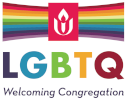Dr. David Robins
On January 1, 2008, same sex civil unions were legalized in the state of New Hampshire, joining Vermont and Massachusetts.
I have been officiating at non-legal, same sex union ceremonies for 20 years, as have most of my UU colleagues.
For almost 200 years, the Unitarian Universalist church of Peterborough has been a voice for reason and progressive religion. Standing in this tradition, and believing in the inherent worth and dignity of people, the congregation voted to be a Welcoming Congregation on April 13, 2003. Welcoming Congregation means that we welcome people who are gay, lesbian, bisexual and transgendered to our membership, to our leadership, to our ministry, to our religious education program, to baptism, child dedications, civil unions, and funerals.
The main point of my message is that I hope you will take the opportunity when it presents itself to tell others about what your UU church does. Your UU church is a welcoming congregation. Your minister officiates at civil union ceremonies. Your church welcomes people who are gay lesbian, bisexual and transgendered to its leadership, its ministry, te4aching, and all parts of the life of the church. We do because it is the right thing to do. Our faith helps us to trust in this. Why is it important for a church to do this?
Churches and houses of worship have traditionally been the most vocal opponents to people who are GLBT. That is why our church must be a visible house of worship that is welcoming. That is why we fly the rainbow flag from the sign board, and why we have welcoming congregation on our website.
Religious opposition is most often based upon several passages found in the Bible which condemn same-sex relationships.
Jesus countered all of the laws and rules of his religious tradition and culture with a single piece of advice. When asked ‘What is the essence of faith and practice? Jesus replied; Love God, and love your neighbor.’ This is the religion of Jesus. In my own way and with my own interpretation, this is the faith and practice to which I subscribe. I would no more try to make a law out of Jesus’ statement than I would try to make a law out of the statements in Leviticus.To make law out of faith statements is to establish religion in our government. This is clearly prohibited in the bill of rights.
The claim that every word in the Bible is the word of God is a faith statement. Faith statements belong within the bounds of faith communities, and not within our legal code. Were we to legally encode the passages of the Bible, we would live in a theocracy, not a democracy. Americans have determined over the centuries that a free people remain free only through a secular, constitutional democracy, free of established religion. Only the unwise would be willing to trade the competition of our political parties for the competition of religious groups.
A faith community should always have the right to determine its own practices (within legal limits). A faith community may or may not choose to welcome people who are GLBT. A faith community may or may not choose to ordain clergy who are GLBT. A faith community may or may not choose to offer civil union ceremonies for same sex couples. But a faith community does not have the right to say to the State or to the U.S. Congress, you may not recognize, or provide equal rights to certain families because they happen to be GLBT. Such intrusion represents the establishment of religion and is unconstitutional.
UU ministers have been officiating at non-legal union ceremonies since 1989. The couples I have been privileged to know are deeply committed to a marriage relationship. They have been together for 5, 10, 15, even twenty years or more. They are having children and raising children. They are loving parents, who teach their children respect, compassion, courage, and good morals. They are valued co-workers, volunteers in the community, and people of profound and sustaining faith. They are appalled at the idea that some people think they will undermine our society and our morals. They are as interested as anyone in maintaining an orderly, ethical, and moral social system. It is unreasonable and discriminatory to deny equal rights to them.
One of the couples for whom I conducted a union ceremony (Linda Ketcham and Kim Fisher,) described their relationship and their legal predicament in this way:
“We have been together for 11 years, our ceremony was over 8 years ago. We have learned that in order to buy a home together there are additional legal steps we had to go through regarding how the mortgage read, to insure that if one of us dies the other keeps the house.
“If my partner wanted to be a stay at home mom we wouldn’t be able to put her or our child on my insurance, since there are no partner benefits unless we are legally married. Likewise there is no bereavement leave. I could not take unpaid Federal Family Medical leave because I am not related to the child.
“We are blessed in having families that recognize and support our commitment as a marriage. We don’t have to worry about whether family would allow one of us to see the other in the hospital or make healthcare decisions for the other. Even so, we have put in place all of the legal documents necessary to protect each other. Not all gays and lesbians are so fortunate. A legally recognized marriage would help those less fortunate than we are.
“We currently live in Wisconsin, and there has been a big to do here of late. Two Republican legislators have introduced legislation to define marriage as between a man and a woman. Their rationale is to protect the sanctity of marriage. Both of these legislators were outraged when another legislator asked them, on the floor of the Assembly, how many times each had been married. Despite one having been married three times and the other five or six times, (he had to stop and think), they argued that the number of their marriages had no relation to the sanctity of marriage. Nobody ever said that you had to actually think to be elected to office.
“We watch the debate and cannot figure out what the opponents are protecting. We are not trying to get married in their churches. We have already found the sanctity of our own. And for that we are blessed.”
In our society, marriage is the recognition of two people who intend to share their lives and property, and who are granted a legal partnership. It is to the benefit of the state to recognize civil unions between couples who are gay or lesbian. To do so is to promote the protection of their children, the financial solvency of their family, medical coverage for dependents, and more.
The ethically right path is to grant all couples equal standing in the eyes of the law. Currently, this path has been legalized in New Hampshire, Vermont and Massachusetts. Denmark, Norway, Sweden, Belgium, England and the Netherlands lave legalized same sex unions. France and Germany permit limited legal recognition for same-sex couples.
Faith communities may continue to officiate only at weddings or civil unoins for couples of their choice, as is now the case. This faith based ideal is an important benchmark to have, but it should not be used to deny legal rights to those who do not fit a religious ideal.
Polls show that 49% of respondents would support civil unions, or legal contracts between people who are gay or lesbian. As many as 14 million children live with at least one lesbian or gay person, or with a same-sex couple. Studies show that children raised by lesbian or gay parents are healthy, happy, and well adjusted socially, emotionally and sexually.
The Unitarian Universalist Association’s goal is to obtain equal status under the marriage laws for opposite and same sex couples. Civil unions will not herald the end of procreation nor of the human race, as nature is quite adept and undeterred in this regard. Civil unions will not mean the end of society but rather will expand the range of what society encompasses and controls. Civil unions will not mean the end of the protection of children, but rather the opposite, more protection. Civil unions will not mean the end of family values but just the opposite when those values are understood to be fidelity, love, honesty, commitment, religious faith, cooperation, and respect.
While many religions believe that God ordained marriage in order to procreate, our society would never force people to have children. Marriage is about the unfolding nature of a lifetime of love and commitment with another person.
I hope that you will take an opportunity when it presents itself to say to others who are against civil unions or people who are GLBT, “My church is a welcoming congregation. We believe it is the right thing to do. Our ministers officiate at civil unions and have been doing so for 20 years.”
When the opportunity presents itself, would you speak our message with love and courage, “We are a welcoming congregation, believing in love, equality, and families of many kinds.”


